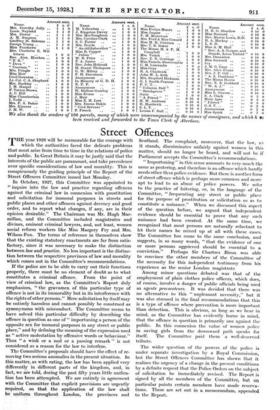Street Offences T HE year 1928 will be memorable for the
courage with which the authorities faced the delicate problenis that must arise from time to time in the relations of police and public. In Great Britain it may be justly said that the interests of the public are paramount, and take precedence over specific considerations of law and morality. This is conspicuously the guiding principle of the Report of the Street Offences Committee issued last Monday. - In October, 1927, this Committee was appointed to " inquire into the law and practice regarding offences against the criminal law in connexion with prostitution and solicitation for immoral purposes in streets and public places and other offences against decency and good order, and to report what changes, if any, are in their opinion desirable." The Chairman was Mr. Hugh Mac- millan, and the Committee included magistrates and divines, eminent criminal lawyers, and, not least, women social reform workers like Miss Margery Fry and Mrs. Wilson-Fox. The terms of reference in themselves show that the existing statutory enactments are far from satis- factory, since it was necessary to make the distinction between law and practice. No less important is the distinc- tion between the respective provinces of law and morality which comes out in the Committee's recommendations.
If the police are to be able to carry out their functions properly, there _must be no element of doubt as to what constitutes a criminal offence. From the point of view of criminal law, as the Committee's Report duly emphasizes, " the gravamen of this particular type of offence is not in its immorality but in its interference with the rights of other persons." Mere solicitation by itself may be entirely harmless and cannot possibly be construed as synonymous with misconduct. The Committee seem to have solved this particular difficulty by describing the offence in question as one of " importuning a person of the opposite sex for immoral purposes in any street or public place," and by defining the meaning of the expression used as " active molestation by offensive words or behaviOur." Thus " a wink or a nod or a passing remark " is not considered as a reason for the law to interfere.
The Committee's proposals should have the effect of re- moving two serious anomalies in the present situation. In this matter, as with rating, the law has been applied very differently in different parts of the kingdom, and, in fact, we are told, during the past fifty years little unifica- tion has been attempted. We are entirely in agreement with the Committee that explicit provisions are urgently required, so that the application of the law shall be uniform throughout London, the provinces and Scotland. The complaint, moreover, that the law, ai it stands, discriminates unfairly against women in this matter, should no longer be heard, and will' not be if Parliament accepts the Committee's recommendations.
" Importuning " in this sense amounts to very much the same as pestering, and therefore is an offence which hardly needs other than police evidence. But there is another form of street offence which is perhaps more common and more apt to lead to an abuse of police powers. We refer to the practice of loitering, or, in the language of t'he Committee, " frequenting any street or public plate for the purpose of prostitution or solicitation so as to constitute a nuisance." When we discussed this aspect of the question before, we argued that independent evidence should be essential to prove that any such nuisance had been created. At the same time, we recognized that most persons are naturally reluctant to let their names be mixed up at all with these cases. The Committee has come to the same conclusion, and suggests, in so many words, " that the evidence of one or more 'persons aggrieved should be essential to a conviction." Perhaps Sir Chartres .Biron was able to convince the other- members of the Committee of the necessity for this independent testimony from his experience as the senior London magistrate Among minor questions debated was that of the employment of plain clothes police officers, which does, of course, involve a danger of public officials being used as agents provocateurs. It was decided that there wa's no alternative to this " unpleasant necessity," but it was also stressed in the final recommendations that this is a type of offence where prevention is more important than detection. This is obvious, so long as we bear in mind, as the Committee has evidently borne in mind, that the offence in queition is primarily one against the public. In this connexion the value of women police in saving girls from the downward path speaks for itself. The Committee paid them a well-deserved tribute.
The wider question of the powers of the police is under separate investigation by a Royal Commission, but the Street Offences Committee has shown that it realizes the urgency of a change in the present conditions by a definite request that the Police Orders on the-subject of solicitation be immediately revised. The Report is signed by all the members of the Committee, but on particular points certain members have made reserva- tions. These are set out in a memorandum, appended to the Report.








































 Previous page
Previous page